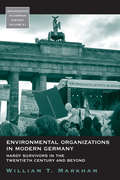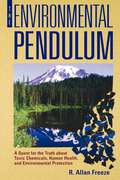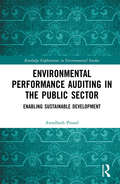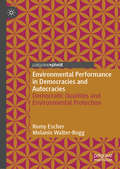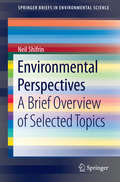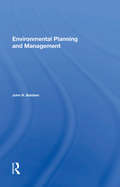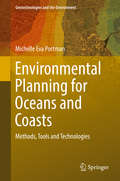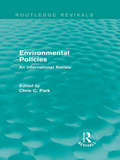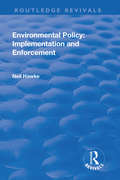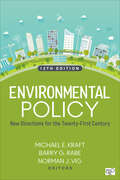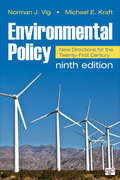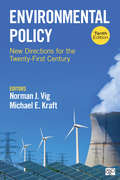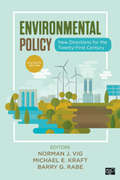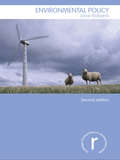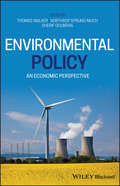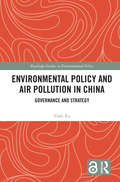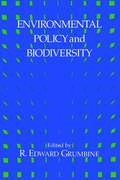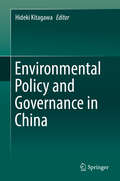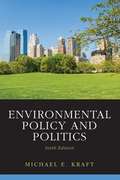- Table View
- List View
Environmental Organizations In Modern Germany: Hardy Survivors in the Twentieth Century and Beyond (Monographs in German History #21)
by William T. MarkhamGerman environmental organizations have doggedly pursued environmental protection through difficult times: hyperinflation and war, National Socialist rule, postwar devastation, state socialism in the GDR, and confrontation with the authorities during the 1970s and 1980s. The author recounts the fascinating and sometimes dramatic story of these organizations from their origins at the end of the nineteenth century to the present, not only describing how they reacted to powerful social movements, including the homeland protection and socialist movements in the early years of the twentieth century, the Nazi movement, and the anti-nuclear and new social movements of the 1970s and 1980s, but also examining strategies for survival in periods like the current one, when environmental concerns are not at the top of the national agenda. Previous analyses of environmental organizations have almost invariably viewed them as parts of larger social structures, that is, as components of social movements, as interest groups within a political system, or as contributors to civil society. This book, by contrast, starts from the premise that through the use of theories developed specifically to analyze the behavior of organizations and NGOs we can gain additional insight into why environmental organizations behave as they do.
The Environmental Pendulum: A Quest for the Truth about Toxic Chemicals, Human Health, and Environmental Protection
by R. Allan FreezeThe pendulum of environmental policy swings from one extreme to the other, depending on which camp is in power and who has the ear of the media. Underkill is followed by overkill. Concern breeds action; disillusion breeds reaction. The Environmental Pendulum provides a thoughtful and evenhanded assessment of this conflict. Tens of thousands of sites across the country are contaminated with toxic chemicals. Environmentalists warn us that this legacy of carelessness is seriously affecting both human health and the ecological balance of nature. They point out that even improved industrial practices will not eliminate future chemical releases to the environment. Their demand for regulatory control has received wide public support and led to the passage of the Superfund legislation in 1980. Now, after twenty years, the value of the Superfund program is being challenged by corporate America, which argues that excessive cleanup costs have the potential to bankrupt the nation. R. Allan Freeze outlines the difficulties associated with the management of hazardous waste and offers a balanced account of the controversy over the role of environmental contamination in human health. Freeze clarifies what matters and what doesn't with respect to chemical contaminants in the environment, arguing that environmental policies should be based on an accurate appraisal of the risks associated with these toxins. He concludes the book with a brilliant summation of the good news and the bad news of environmental pollution, describing what can and can't be done to bring the situation under control.
Environmental Performance Auditing in the Public Sector: Enabling Sustainable Development (Routledge Explorations in Environmental Studies)
by Awadhesh PrasadEnvironment and sustainable development challenges are a matter of global concern. Trillions of dollars of mostly public money are invested every year in domestic and international policies and programs to address these challenges. The effectiveness of these policies and programs is critical to environmental sustainability. Performance audits that examine the effectiveness of governmental policies and programs heavily influence their implementation. Despite this, performance auditing in the environment field has received very little academic attention. This book takes a closer look at performance auditing of public sector environmental policies and programs. It examines trends in global environmental performance auditing; and how it is currently practiced drawing on a global survey and case studies from Canada, India and Australia. In doing so, it identifies issues and challenges faced by Supreme Audit Institutions in undertaking these performance audits. This book will be of interest to students, scholars and practitioners of sustainable development, environmental auditing and public sector auditing as well as to donor organisations engaged in these areas.
Environmental Performance in Democracies and Autocracies: Democratic Qualities and Environmental Protection
by Romy Escher Melanie Walter-RoggThere are considerable differences in environmental performance and outcomes across both democracies and autocracies, but there is little understanding of how levels of democracy and autocracy influence environmental performance. This book examines whether analysing the effects of individual democratic features separately can contribute to a better understanding of cross-national variance in environmental performance. The authors show that levels of social equality in particular, as well as the strength of local and regional democracy, contribute significantly to explaining cross-national variation in environmental performance. On the other hand, a high level of political corruption affects a country’s ability to adopt and implement environmental policies effectively. In exploring the inter-relationship between democratic qualities, political corruption, and environmental performance, this book presents policymakers and political theorists with a clear picture of which aspects of democratic societies are most conducive to producing a better environment.
Environmental Personhood: New Trajectories in Law (New Trajectories in Law)
by Francine RochfordThis book examines the increasingly widespread movement to recognise the environment as a legal person. Several countries have now recognized that nature, or parts of nature, have juristic personhood. In this book, the concept of legal personhood and its incidents are interrogated with a view to determining whether this is, or could be, a positive contribution to modern environmental problems. Surveying historical and current positions on the juristic concept of legal personhood, the book engages recent legislation and case law, in order to consider the attempt in several countries to vest personhood in rivers, river basins and ecosystems. Comparing approaches in a range of countries – including New Zealand, India, Ecuador, the United States and Australia, it addresses the methods employed, the purported aims, the mechanisms for enforcement, and the entrenchment of legal protections. Throughout, the book elicits the difficult relationship between an historically anthropocentric idea of personhood and its extension beyond the human; concluding that the attribution of personhood to the environment is an important, but limited, contribution to environmental sustainability. Accessibly written, this book will appeal to scholars, students and others with interests in environmental law, environmental science and public policy, and ecology more generally.
Environmental Perspectives
by Neil ShifrinThis short, readable book is intended as a big-picture introduction/overview for environmental students and lay-people involved with environmental issues. Every freshman in college intending to study environmental science should read it. It begins with a historical perspective on waste and environmental control. Basic instruction on some important fundamentals faced by environmental professionals every day, such as sampling, analysis, data visualization, risk assessment and forensic chemistry are provided in the following chapter. Important regulatory fundamentals, such as the National Contingency Plan, which is the U. S. regulatory framework for addressing hazardous waste is also defined. The book concludes with pertinent and provocative considerations on the future of environmental management, such as alternative approaches (technical impracticability), the "not-in-my-backyard syndrome," and the safety of chemicals in consumer products. The book contains many useful facts about waste production rates, energy use and recycling rates--all referenced to allow substantiation and provide a springboard for further research.
Environmental Philosophy: From Animal Rights to Radical Ecology
by Michael E. Zimmerman J. Baird Callicott John Clark Irene J. Klaver Karen J. WarrenEdited by leading experts in contemporary environmental philosophy, this anthology features the best available selections that cover the full range of positions within this rapidly developing field. Divided into four sections that delve into the vast issues of contemporary Eco-philosophy, the Fourth Edition now includes a section on Continental Environmental Philosophy that explores current topics such as the social construction of nature, and eco-phenomenology. Each section is introduced and edited by a leading philosopher in the field. For professionals with a career within the environmental field including law, politics, conservation, geography, and biology.
Environmental Planning And Management
by John H BaldwinA comprehensive overview and discussion of all major aspects of environmental planning and management, Professor Baldwin's textbook highlights the causes and interrelationships of environmental problems, emphasizing the important economic and ecological functions of the land as the stage for all human activities and the "source" and "sink" for all
Environmental Planning for Oceans and Coasts
by Michelle Eva PortmanThis book informsenvironmental planning professionals, students and those interested in oceansand coasts from an environmental perspective about what is needed for planningand management of these unique environments. It is comprised of twelve chaptersorganized in three parts. Part I highlights the basics tenets of environmentalplanning for oceans and coasts including important concepts from the generalfield of planning and coastal and ocean management (e. g. , hydrography, oceanspolicy and law, geomorphology). Environmental problems inherent within oceansand coasts (such as sea level rise, marine pollution, overdevelopment, etc. )are also addressed, especially those at the land-sea interface. Part II coversthose methodological approaches regularly used by planners working to improveenvironmental quality and conditions of oceans and coasts among them: integrated planning andmanagement, ecosystem services, pollution prevention, and marine spatialplanning. Part III focuses specifically on state-of-the-art tools andtechnologies employed by planners for marine and coastal protection. Theseinclude systematic conservation planning for protected areas, decision supporttools, coastal adaptation techniques and various types of communication, includingvisualization, narration and tools for stakeholder participation. The finalchapter in the book reviews the most important concepts covered throughout bookand emphasizes the important role that environmental planners have to play inthe protection and well-being of oceans and coasts. Michael K. Orbach, of the Nicholas School of the Environment at Duke University, pennedthe book's foreword.
Environmental Policies: An International Review (Routledge Revivals)
by Chris C. ParkThe importance of the effective management of the natural environment has become vital over the past few decades. In different countries, varying policies are implemented by governments to manage the environment, both to foster growth and reduce pollution and destruction. Employing a broad country-based approach, this edited collection, first published in 1986, surveys the growth, nature and effectiveness of the environmental management policies implemented by governments around the world. The overarching argument is that a coherent international approach is needed to deal with the problems surrounding environmental sustainability. This title will be of great value to students of the natural environment, sustainability and resource management.
Environmental Policy: Implementation and Enforcement (Routledge Revivals)
by Neil HawkeThis title was first published in 2002. Environmental Policy is an astute and far-reaching text which analyzes the intersections between environmental policy formation and its ultimate implementation and enforcement through the law. It sets this theme against the axis of EU law and policy and UK law and policy, paying particular attention to the variables which determine the nature and significance of law as a delivery vehicle . Among these variables are the shape and character of EU and UK law for present purposes, alternatives to law, and the culture of UK law and policy aiding a distinct pattern of response to Directives, for example. It takes an informed look at the reality of implementation and enforcement through its reference to policy objectives as well as the limits and appropriateness of law across the aforementioned axis . An indispensable resource for scholars and students of environmental law and policy, along with governmental and other environmental agencies responsible for policy creation, implementation and enforcement.
Environmental Policy: New Directions for the Twenty-First Century
by Michael E. Kraft Barry G. RabeAs environmental issues continue to become more prevalent in society and surrounding policy challenges become more complex, Environmental Policy once again brings together top scholars to evaluate the changes and continuities in American environmental policy since the late 1960s and their implications for current policy. Students will learn to decipher the underlying trends, institutional constraints, and policy dilemmas that shape today’s environmental politics as they evaluate approaches to future challenges.
Environmental Policy: New Directions for the Twenty-First Century
by Michael E. Kraft Barry G. RabeAs environmental issues continue to become more prevalent in society and surrounding policy challenges become more complex, Environmental Policy once again brings together top scholars to evaluate the changes and continuities in American environmental policy since the late 1960s and their implications for current policy. Students will learn to decipher the underlying trends, institutional constraints, and policy dilemmas that shape today’s environmental politics as they evaluate approaches to future challenges.
Environmental Policy: New Directions for the Twenty-First Century
by Mr Michael E. Kraft Mr Norman J. VigAuthoritative and trusted, Environmental Policy convenes top scholars to evaluate the impact of past environmental policy while anticipating its future implications, helping students decipher the underlying trends, institutional constraints, and policy dilemmas that shape environmental politics. In the Ninth Edition, editors Norman Vig and Michael Kraft offer coverage of the latest issues, including the energy and natural resource policy dilemmas, sustainable cities, and the environmental impact of food production and consumption. A new concluding chapter ties the contributed material together with an assessment of the remaining environmental policy challenges for the 21st century.
Environmental Policy: New Directions for the Twenty-First Century
by Mr Michael E. Kraft Mr Norman J. VigAuthoritative and trusted, Environmental Policy once again brings together top scholars to evaluate the changes and continuities in American environmental policy since the late 1960s and their implications for the twenty-first century. You will learn to decipher the underlying trends, institutional constraints, and policy dilemmas that shape today’s environmental politics. The Tenth Edition examines how policy has changed within federal institutions and state and local governments, as well as how environmental governance affects private sector policies and practices. The book provides in-depth examinations of public policy dilemmas including fracking, food production, urban sustainability, and the viability of using market solutions to address policy challenges. Students will also develop a deeper understanding of global issues such as climate change governance, the implications of the Paris Agreement, and the role of environmental policy in the developing world. Students walk away with a measured yet hopeful evaluation of the future challenges policymakers will confront as the American environmental movement continues to affect the political process.
Environmental Policy: New Directions for the Twenty-First Century
by Mr Michael E. Kraft Mr Norman J. VigAuthoritative and trusted, Environmental Policy once again brings together top scholars to evaluate the changes and continuities in American environmental policy since the late 1960s and their implications for the twenty-first century. You will learn to decipher the underlying trends, institutional constraints, and policy dilemmas that shape today’s environmental politics. The Tenth Edition examines how policy has changed within federal institutions and state and local governments, as well as how environmental governance affects private sector policies and practices. The book provides in-depth examinations of public policy dilemmas including fracking, food production, urban sustainability, and the viability of using market solutions to address policy challenges. Students will also develop a deeper understanding of global issues such as climate change governance, the implications of the Paris Agreement, and the role of environmental policy in the developing world. Students walk away with a measured yet hopeful evaluation of the future challenges policymakers will confront as the American environmental movement continues to affect the political process.
Environmental Policy: New Directions for the Twenty-First Century (The\harpercollins Public Policy Ser.)
by Barry G. Rabe Michael E. Kraft Norman J. VigAuthoritative and trusted, Environmental Policy once again brings together top scholars to evaluate the changes and continuities in American environmental policy since the late 1960s and their implications for the twenty-first century. Students will learn to decipher the underlying trends, institutional constraints, and policy dilemmas that shape today’s environmental politics. The Eleventh Edition examines how policy has changed within federal institutions and state and local governments, as well as how environmental governance affects private sector policies and practices. There are five new chapters in this edition that examine the public’s opinion on the environment, courts, energy policy, natural resource agencies and policies, and the political economy of green growth. The book has been updated to reflect the Trump administration′s four years of policy changes and students will walk away with a measured, yet hopeful evaluation of the future challenges that policymakers will confront as the American environmental movement continues to affect the political process.
Environmental Policy: New Directions for the Twenty-First Century (The\harpercollins Public Policy Ser.)
by Barry G. Rabe Michael E. Kraft Norman J. VigAuthoritative and trusted, Environmental Policy once again brings together top scholars to evaluate the changes and continuities in American environmental policy since the late 1960s and their implications for the twenty-first century. Students will learn to decipher the underlying trends, institutional constraints, and policy dilemmas that shape today’s environmental politics. The Eleventh Edition examines how policy has changed within federal institutions and state and local governments, as well as how environmental governance affects private sector policies and practices. There are five new chapters in this edition that examine the public’s opinion on the environment, courts, energy policy, natural resource agencies and policies, and the political economy of green growth. The book has been updated to reflect the Trump administration′s four years of policy changes and students will walk away with a measured, yet hopeful evaluation of the future challenges that policymakers will confront as the American environmental movement continues to affect the political process.
Environmental Policy
by Jane RobertsEvidence of climate change, resource shortages and biodiversity loss is growing in significance year by year. This second edition of Environmental Policy explains how policy can respond and bring about greater sustainability in individual lifestyles, corporate strategies, national policies and international relations. The book discusses the interaction between environmental and human systems, proposing environmental policy as a way to steer human systems to function within environmental constraints. The second edition has been completely updated to reflect advances in scholarship (for example developments in governance theory) and the increasing primacy of climate policy within environmental policy as a whole. Key political, social and economic concepts are used to explain how effective environmental policies can be designed, implemented and evaluated. Environmental problems, the role of human beings in creating them and sustainable development are all introduced. Environmental policy formulation, implementation and evaluation are discussed within three specific contexts: the firm, the nation state and at an international level. The book reviews the relationship of economics, science and technology to environmental policy. It ends by reflecting upon the predicament of humankind in the twenty-first century and the potential of achieve sustainability through the use of the environmental policy ‘toolbox’. Environmental Policy is an accessible text with a multi-disciplinary perspective. Lively case studies drawn from a range of international examples – and completely updated for this second edition – illustrate issues such as climate change, international trade, tourism and human rights. It includes chapter summaries, suggestions for further reading and links to relevant web resources.
Environmental Policy: New Directions for the Twenty-First Century
by Mr Norman J. Vig Mr Michael E. KraftAuthoritative and trusted, Environmental Policy convenes top scholars to evaluate the impact of past environmental policy while anticipating its future implications, helping students decipher the underlying trends, institutional constraints, and policy dilemmas that shape environmental politics. In the Ninth Edition, editors Norman Vig and Michael Kraft offer coverage of the latest issues, including the energy and natural resource policy dilemmas, sustainable cities, and the environmental impact of food production and consumption. A new concluding chapter ties the contributed material together with an assessment of the remaining environmental policy challenges for the 21st century.
Environmental Policy: An Economic Perspective
by Thomas Walker Northrop Sprung-Much Sherif GoubranEXPAND YOUR UNDERSTANDING OF HOW ENVIRONMENTAL POLICY AFFECTS BUSINESS, THE ECONOMY, AND YOUR LIFE WITH THIS ESSENTIAL RESOURCE Environmental Policy: An Economic Perspective offers readers a comprehensive examination of the ever-broadening scope and impact of environmental policy, law, and regulation. Editors Thomas Walker, Northrop Sprung-Much, and Sherif Goubran walk readers through a variety of subjects while maintaining a global perspective on the expanding role of environmental law. This book takes a pragmatic and practical approach to its subject matter, showing readers the real impact across the world of different kinds of environmental policy. Among other topics, Environmental Policy: An Economic Perspective tackles: Climate change legislation Water conservation and pricing Biodiversity of the marine environment Wildlife ranching Emission trading schemes Green job strategies Sustainable investing Written for undergraduate and graduate students in any field affected by environmental legislation and policy, this book also belongs on the shelves of anyone who seeks to better understand the increasingly important role of environmental policy on their business and life.
Environmental Policy and Air Pollution in China: Governance and Strategy (Routledge Studies in Environmental Policy)
by Yuan XuThis book systematically analyzes how and why China has expectedly lost and then surprisingly gained ground in the quest to solve the complicated environmental problem of air pollution over the past two decades. Yuan Xu shines a light on how China’s sulfur dioxide emissions rose quickly in tandem with rapid economic growth but then dropped to a level not seen for at least four decades. Despite this favorable mitigation outcome, Xu details how this stemmed from a litany of policy stumbles within the Chinese context of no democracy and a lack of sound rule of law. Throughout this book, the author examines China’s environmental governance and strategy and how they shape environmental policy. The chapters weave together a goal-centered governance model that China has adopted of centralized goal setting, decentralized goal attainment, decentralized policy making and implementation. Xu concludes that this model provides compelling evidence that China’s worst environmental years reside in the past. This book will be of great interest to students and scholars of Chinese environmental policy and governance, air pollution, climate change and sustainable development, as well as practitioners and policy makers working in these fields.
Environmental Policy and Biodiversity
by R. Edward GrumbineScientists and policymakers must work together if solutions to the biodiversity crisis are to be found. Yet all too often, scientific data are unknown or incomprehensible to policymakers, and political realities are not fully appreciated by scientists.Environmental Policy and Biodiversity addresses that problem by presenting both an overview of important concepts in the field of conservation biology and an examination of the strengths and limitations of the policymaking process. Topics covered include: the ethical and scientific bases of conservation biology the effectiveness of existing environmental policy in protecting biodiversity case studies from California, the Great Lakes region, southern Appalachia, and the Florida panhandle an examination of overall environmental policy goals and processes Featuring provocative and clearly argued essays from a range of disciplines, Environmental Policy and Biodiversity provides resource professionals with valuable insight into conservation issues, and can serve as a useful tool in both graduate and undergraduate courses in conservation biology and environmental policy.
Environmental Policy and Governance in China
by Hideki KitagawaThis book focuses on how to create an environmentally friendly society in China from the viewpoint of environmental law and policy. The authors accessed a great number of valuable sources not available in English, and interviewed various scholars and public officials, in order to analyze the environmental policies in China while comparing some of the features to Japan. The book stresses the importance of introducing a brand-new policy of central and local government, and analyses why these policies have not been executed effectively in the local society. In addition to the economy-oriented policy and spirit of the Chinese nation, which are the main causes, this book also highlights shortcomings in the inspection system, information management, and the extremely low degree of public participation as important aspects to focus on in order to tackle the current problems. The individual chapters will help readers to understand the environmental issues in China in depth, and provide guidance on resolving the issues in China and in developing countries that are now or soon will be facing the challenge of combining economic growth and environmental improvement. Air, water and soil pollution are serious challenges in China. The deterioration of the environment often leads to rioting that influences social stability, which is also a great concern to foreign investors. This book will be of interest to a professional audience such as policymakers, journalists, members of environmental NGOs, managers and employees who do business with China, as well as academic researchers and students.
Environmental Policy and Politics
by Michael KraftCovering global threats such as climate change, population growth, and loss of biodiversity, as well as national, state, and local problems of environmental pollution, energy use, and natural resource use and conservation, Environmental Policy and Politics provides a comprehensive overview of U.S. policy-making processes, the legislative and administrative settings for policy decisions, the role of interest groups and public opinion in environmental politics, and the public policies that result. It helps readers understand modern environmental policy and its implications, including the need for a comprehensive and integrated approach to problem solving.
